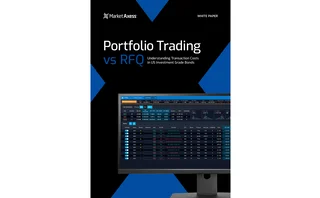The Dying Lifecycle of an Algorithm

A while back I wrote a cover story for Waters on Lincoln Capital's Stephen Temes and he told me about how he felt there were firms out there that intentionally tried to figure out his algorithms and execute against them-or, game them.
"You have to really keep ahead of the curve," Temes told me. "When you start to see your orders being gamed or when things change in algorithms, you've got to quickly make changes. There are programs that are out there that look for my order and know to shoot against it."
I was reminded of this quote yesterday at Sifma 2011 after I met with Simon Garland, chief strategist of database provider Kx Systems. Whereas, in years past the typical short-end of a lifecycle for an algorithm ran about seven weeks, that timeframe has been significantly reduced, according to some of Garland's clients.
"We were speaking with a high-frequency trader a couple of days ago and he said that the typical life of an algorithm, these days, is about two weeks, because as soon as the people are on to you, then of course it's over and you have to do something else. Two weeks is the minimum now, because that's someone who's really good. So you can't send your good guys on holiday because they've got to have a new algorithm in two weeks."
When I told him that I was surprised by that-especially considering all the time and effort that goes into building an effective algo-Garland agreed.
"The two weeks surprised me, too; I thought it was longer," he says. I thought if you were really smart you could manage it a little bit longer than that."
So my question to the industry is this: Does two weeks sound too short...or even too long?
Only users who have a paid subscription or are part of a corporate subscription are able to print or copy content.
To access these options, along with all other subscription benefits, please contact info@waterstechnology.com or view our subscription options here: http://subscriptions.waterstechnology.com/subscribe
You are currently unable to print this content. Please contact info@waterstechnology.com to find out more.
You are currently unable to copy this content. Please contact info@waterstechnology.com to find out more.
Copyright Infopro Digital Limited. All rights reserved.
As outlined in our terms and conditions, https://www.infopro-digital.com/terms-and-conditions/subscriptions/ (point 2.4), printing is limited to a single copy.
If you would like to purchase additional rights please email info@waterstechnology.com
Copyright Infopro Digital Limited. All rights reserved.
You may share this content using our article tools. As outlined in our terms and conditions, https://www.infopro-digital.com/terms-and-conditions/subscriptions/ (clause 2.4), an Authorised User may only make one copy of the materials for their own personal use. You must also comply with the restrictions in clause 2.5.
If you would like to purchase additional rights please email info@waterstechnology.com
More on Trading Tech
DORA flood pitches banks against vendors
Firms ask vendors for late addendums sometimes unrelated to resiliency, requiring renegotiation
IPC’s C-suite shuffle signals bigger changes for trader voice tech
Waters Wrap: After a series of personnel changes at the legacy provider, WatersTechnology examines what these moves might mean for the future of turrets and trader voice.
WatersTechnology latest edition
Check out our latest edition, plus more than 12 years of our best content.
From no chance to no brainer: Inside outsourced trading’s buy-side charm offensive
Previously regarded with hesitancy and suspicion by the buy side, four asset managers explain their reasons for embracing outsourced trading.
Band-aids vs build-outs: Best practices for exchange software migrations
Heetesh Rawal writes that legacy exchange systems are under pressure to scale to support new asset classes and greater volumes, leaving exchange operators with a stark choice: patch up outdated systems and hope for the best or embark on risky but rewarding replacement projects.
Portfolio trading vs RFQ: Understanding transaction costs in US investment-grade bonds
The MarketAxess research team explores how such factors as order size, liquidity profiles and associated costs determine whether a portfolio trade or an RFQ list trade is the optimal choice.
IEX, MEMX spar over new exchange’s now-approved infrastructure model
As more exchanges look to operate around-the-clock venues, the disagreement has put the practices of market tech infrastructure providers under a microscope.
The Waters Cooler: The Thanksgiving debrief
Maybe we shouldn’t use AI for EVERYTHING! I’m talking to YOU, Spotify!








